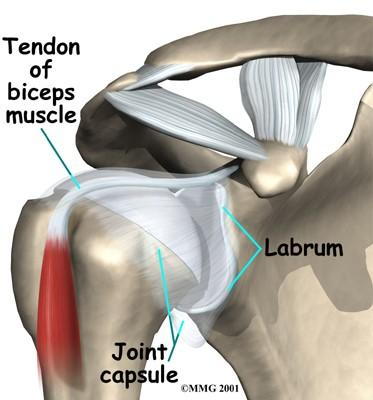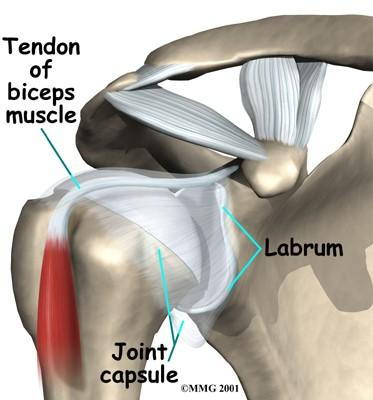
Shoulder injuries are often a debilitating condition that can severely limit your function. The shoulder is a complicated joint due to all the ligamentous and muscular attachments. Injuries can include rotator cuff tears, acromioclavicular tears, bursitis, labral tears, frozen shoulder, scapular dyskinesia, shoulder impingement, dislocation, separation, and the list goes on.
Common Shoulder Injuries and Lebral Tears
The most common type of injury seen is superior labrum anteroposterior (SLAP) tears. The tear typically occurs at the origin of the long head of the biceps tendon and extends into the labrum posteriorly and into adjacent structures. This is due to an overload of forces during throwing, or overhead activity.
Risk factors for this type of tear include male gender, level of overhead activity, and age. If the tear is not addressed, concomitant shoulder injuries may occur.


Shoulder Injury Treatments
Nonsurgical treatment of SLAP lesions have been reported to decrease pain and increase function and should always be performed prior to surgical intervention. Non-surgical treatment focuses on scapular dyskinesia (immobile shoulder blade) and posterior capsular tightness playing significant roles as pain generators in the shoulder.
Typical non-conservative treatment includes:
- Chiropractic adjustments of the scapula, shoulder, hip and lower extremity
- Soft tissue mobilization via Active Release Technique (ART) or Graston typically on supraspinatus, infraspinatus, teres minor, subscapularis, biceps and pectoralis major
- Open and closed chain rotator cuff exercises with dumbbells, resistance bands and eccentric rotator cuff exercises.
- Stretching of the posterior capsule in a non-ballistic manner in both internal rotation at 90 of abduction and cross-body stretching with the scapula stabilized.
- K-laser treatment to promote the healing process
- Epsom salt bath for 15-20 minutes
- Anti-inflammatory diet: dark leafy greens, berries, whole grains, beans, nuts, salmon and tumeric. Avoid sugars (processed and added), dairy, and red meat
Non-surgical conservative care, when done properly, can be highly effective in the initial treatment of some types of labral tears. Type I tears respond very well to conservative care and oftentimes will not require surgery. In many cases of Type II, III, and IV tears, conservative care may be enough to restore proper function to the shoulder girdle without the need for surgery.
Experience Shoulder Injury Relief Today with Team Chiro
Anyone can crack a back, neck, or knuckles. However, only a spinal engineer can truly fix the spinal issues you are facing and generate the greatest long-term relief. At Team Chiropractic, our team of qualified spinal engineers works hard to create a custom treatment plan according to what your body needs for long-term restoration.
With over 25 years of service, we are the leading spinal adjustment practice in the Raleigh area and are uniquely suited to helping relieve your sciatica pain through safe, professional spinal adjustment. Our Certified Chiropractic Extremity Practitioners (CCEP) and Certified Chiropractic Sports Physicians (CCSP) enables us to correct the overall biomechanics, which enables you to hold your correction.
We believe in the six essentials to healthy living: spiritual/mental alignment, physical alignment, nutritional alignment, exercise in alignment, rest in alignment, and removing chemical stress. By offering both services and products that adhere to the six essentials, we help promote an overall health and wellness treatment for every client who comes through our doors.
If you or someone you know is recovering from a shoulder injury or needs back pain relief in Raleigh, we are here to help! Contact us online today or give us a call at 919-788-8881 to schedule your initial appointment and x-ray. We look forward to helping restore your health.
Dr. Hemmer MS, DC
References
- Blanchette, M. Conservative treatment of a rock climber with a SLAP lesion: a case report. Journal of the Canadian Chiropractic Association, 59(3), 238-244. Doi:0008-3194
- Fedoriw WW, Ramkumar P, McCulloch PC, Lintner DM. “Return to Play After Treatment of Superior Labral Tears in Professional Baseball Players” American Journal of Sports Medicine, 42(5):1155-1160.
- Neuman BJ, Boisvert CB, Reiter B, Lawson K, Ciccotti MG. Cohen SB. “Results of Arthroscopic Repair of Type II Superior Labral Anterior Posterior Lesions in Overhead Athletes.” American Journal of Sports Medicine, 39, (9): 1883-1888.
- Gottschalk MB, Karas SG, Ghattas TN, Burdette R. “Subpectoral Biceps Tenodesis for the Treatment of Type II and IV Superior Labral Anterior and Posterior Lesions.” The American Journal of Sports Medicine, 42, (9): 2128-2135.

Shoulder injuries are often a debilitating condition that can severely limit your function. The shoulder is a complicated joint due to all the ligamentous and muscular attachments. Injuries can include rotator cuff tears, acromioclavicular tears, bursitis, labral tears, frozen shoulder, scapular dyskinesia, shoulder impingement, dislocation, separation, and the list goes on.
Common Shoulder Injuries and Lebral Tears
The most common type of injury seen is superior labrum anteroposterior (SLAP) tears. The tear typically occurs at the origin of the long head of the biceps tendon and extends into the labrum posteriorly and into adjacent structures. This is due to an overload of forces during throwing, or overhead activity.
Risk factors for this type of tear include male gender, level of overhead activity, and age. If the tear is not addressed, concomitant shoulder injuries may occur.


Shoulder Injury Treatments
Nonsurgical treatment of SLAP lesions have been reported to decrease pain and increase function and should always be performed prior to surgical intervention. Non-surgical treatment focuses on scapular dyskinesia (immobile shoulder blade) and posterior capsular tightness playing significant roles as pain generators in the shoulder.
Typical non-conservative treatment includes:
- Chiropractic adjustments of the scapula, shoulder, hip and lower extremity
- Soft tissue mobilization via Active Release Technique (ART) or Graston typically on supraspinatus, infraspinatus, teres minor, subscapularis, biceps and pectoralis major
- Open and closed chain rotator cuff exercises with dumbbells, resistance bands and eccentric rotator cuff exercises.
- Stretching of the posterior capsule in a non-ballistic manner in both internal rotation at 90 of abduction and cross-body stretching with the scapula stabilized.
- K-laser treatment to promote the healing process
- Epsom salt bath for 15-20 minutes
- Anti-inflammatory diet: dark leafy greens, berries, whole grains, beans, nuts, salmon and tumeric. Avoid sugars (processed and added), dairy, and red meat
Non-surgical conservative care, when done properly, can be highly effective in the initial treatment of some types of labral tears. Type I tears respond very well to conservative care and oftentimes will not require surgery. In many cases of Type II, III, and IV tears, conservative care may be enough to restore proper function to the shoulder girdle without the need for surgery.
Experience Shoulder Injury Relief Today with Team Chiro
Anyone can crack a back, neck, or knuckles. However, only a spinal engineer can truly fix the spinal issues you are facing and generate the greatest long-term relief. At Team Chiropractic, our team of qualified spinal engineers works hard to create a custom treatment plan according to what your body needs for long-term restoration.
With over 25 years of service, we are the leading spinal adjustment practice in the Raleigh area and are uniquely suited to helping relieve your sciatica pain through safe, professional spinal adjustment. Our Certified Chiropractic Extremity Practitioners (CCEP) and Certified Chiropractic Sports Physicians (CCSP) enables us to correct the overall biomechanics, which enables you to hold your correction.
We believe in the six essentials to healthy living: spiritual/mental alignment, physical alignment, nutritional alignment, exercise in alignment, rest in alignment, and removing chemical stress. By offering both services and products that adhere to the six essentials, we help promote an overall health and wellness treatment for every client who comes through our doors.
If you or someone you know is recovering from a shoulder injury or needs back pain relief in Raleigh, we are here to help! Contact us online today or give us a call at 919-788-8881 to schedule your initial appointment and x-ray. We look forward to helping restore your health.
Dr. Hemmer MS, DC
References
- Blanchette, M. Conservative treatment of a rock climber with a SLAP lesion: a case report. Journal of the Canadian Chiropractic Association, 59(3), 238-244. Doi:0008-3194
- Fedoriw WW, Ramkumar P, McCulloch PC, Lintner DM. “Return to Play After Treatment of Superior Labral Tears in Professional Baseball Players” American Journal of Sports Medicine, 42(5):1155-1160.
- Neuman BJ, Boisvert CB, Reiter B, Lawson K, Ciccotti MG. Cohen SB. “Results of Arthroscopic Repair of Type II Superior Labral Anterior Posterior Lesions in Overhead Athletes.” American Journal of Sports Medicine, 39, (9): 1883-1888.
- Gottschalk MB, Karas SG, Ghattas TN, Burdette R. “Subpectoral Biceps Tenodesis for the Treatment of Type II and IV Superior Labral Anterior and Posterior Lesions.” The American Journal of Sports Medicine, 42, (9): 2128-2135.
Contact Us
Raleigh Office
309 W Millbrook Rd STE 199
Raleigh, NC 27609
Hours:
Monday: 7:30AM–12PM & 3PM–6PM
Tuesday: 7:30AM–12PM & 3PM–6PM
Wednesday: 7:30AM–12PM
Thursday: 7:30–12PM & 3PM–6PM
Friday: 7:30AM–12PM
Saturday & Sunday: Closed
Wakefield Office
12740 Spruce Tree Way STE 103
Raleigh, NC 27614
Hours:
Tuesday: 7:30AM–12PM
Wednesday: 7:30AM–12PM & 3:15–6:00PM
Thursday: 3:15-6:00PM
Friday: 7:30AM–12PM
Saturday & Sunday: Closed

